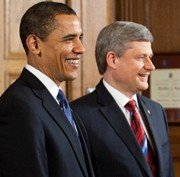The 2009 Canadian federal budget, while hailed by many as a welcome stimulus to the economy, is clear evidence that the government is not doing enough to support the environment, particularly the development of renewable energy.
While on the surface the $1 billion pledged by Prime Minister Stephen Harper to support renewable energy projects over the next five years may appear generous, when compared with the $2.7 billion of emergency funding the budget has allocated to the Canadian auto industry - plus a $12 billion program to help finance car leasing - it sounds almost laughable. And let's not forget the $75 billion mortgage bailouts.
Some gains were made for the environment, including $407 million over two years for passenger rail, $300 million for energy efficient home retrofits, and $80 million to manage already contaminated sites. However, these measures do not go far enough, say environmental campaigners.
“Although this budget has some pockets of green spending, overall it represents a missed opportunity for the government to position Canada as a leader in the green economy of the future," said Peter Robinson, CEO of the David Suzuki Foundation. (See an environmental analysis of the 2009 federal budget by the David Suzuki Foundation here.)
"Contrast this with what our major trading partner, the US, is doing under President Barack Obama. President Obama just announced $55 billion in immediate green stimulus spending. Meanwhile, less than five per cent of Canada’s budget is allocated to immediate green stimulus spending.”
As part of its environment plan, the Conservative budget is also allocating $351 million to Atomic Energy of Canada Ltd., and establishing a new $375 million Clean Energy Fund to capture and store carbon dioxide underground, a measure which critics say will simply encourage the use of CO2-emitting fossil fuels.
In addition, there was no new funding allocated to the ecoENERGY for Renewable Power Program (eRPP), a scheme set up in 2007 to provide production incentives for renewable energy projects. (The equivalent scheme in the US has just been extended by another three years - watch the US benefit at Canada's expense.)
It is estimated that the eRPP will run out of money to support new development by the end of the next fiscal year, according to the Canadian Wind Energy Association (CanWEA), which is disappointed that Canada is not keeping up with the rest of the world in supporting renewable energy.
“Between now and 2020, it is projected that $1 trillion will be invested in wind energy globally, creating more than 1.75 million jobs," said Robert Hornung, President of CanWEA.
"If Canada wishes to capture a growing portion of this rapidly expanding global economic opportunity, and is seeking to maximize the economic and environmental benefits of wind energy development, Parliament will need to take actions well beyond anything included in today’s federal budget."
In its "Wind Vision" report, released in October 2008, CanWEA argues that Canada is lagging behind other countries in wind power capacity - it ranks 16th in the world - because it is failing to factor environmental costs into energy costs, making renewable energy less competitive.
CanWEA predicts that an eRPP expansion and extension would have resulted in over $6 billion in new private sector investment into the Canadian economy and created 8,000 new jobs over the next five years. Given a change in priorities by the government, it estimates that by 2025 $125 billion in new investments could be made.
Now doesn't that sound a safer bet than pouring all the country's money into the auto industry?








Once again, the Canadian government, and the Harper government in particular, have their priorities in the wrong place. It is a no-brainer that the environment should be closer to the top of their list, seeing as every single Canadian is (obviously!) affected by climate change. The money is instead going to what, then? A struggling auto industry and the bloated housing market.
ReplyDeleteLots of Canadians hold Canada in such high regard as a place to live - but the governments ignorance on issues such as these that make me wonder why.